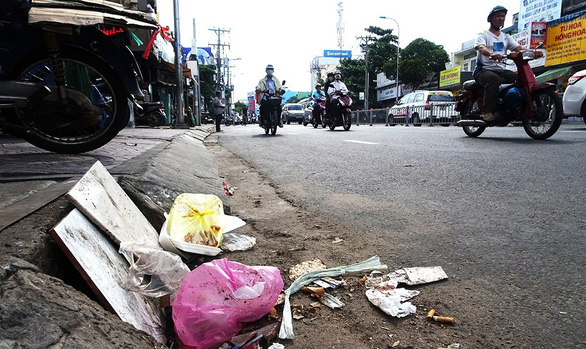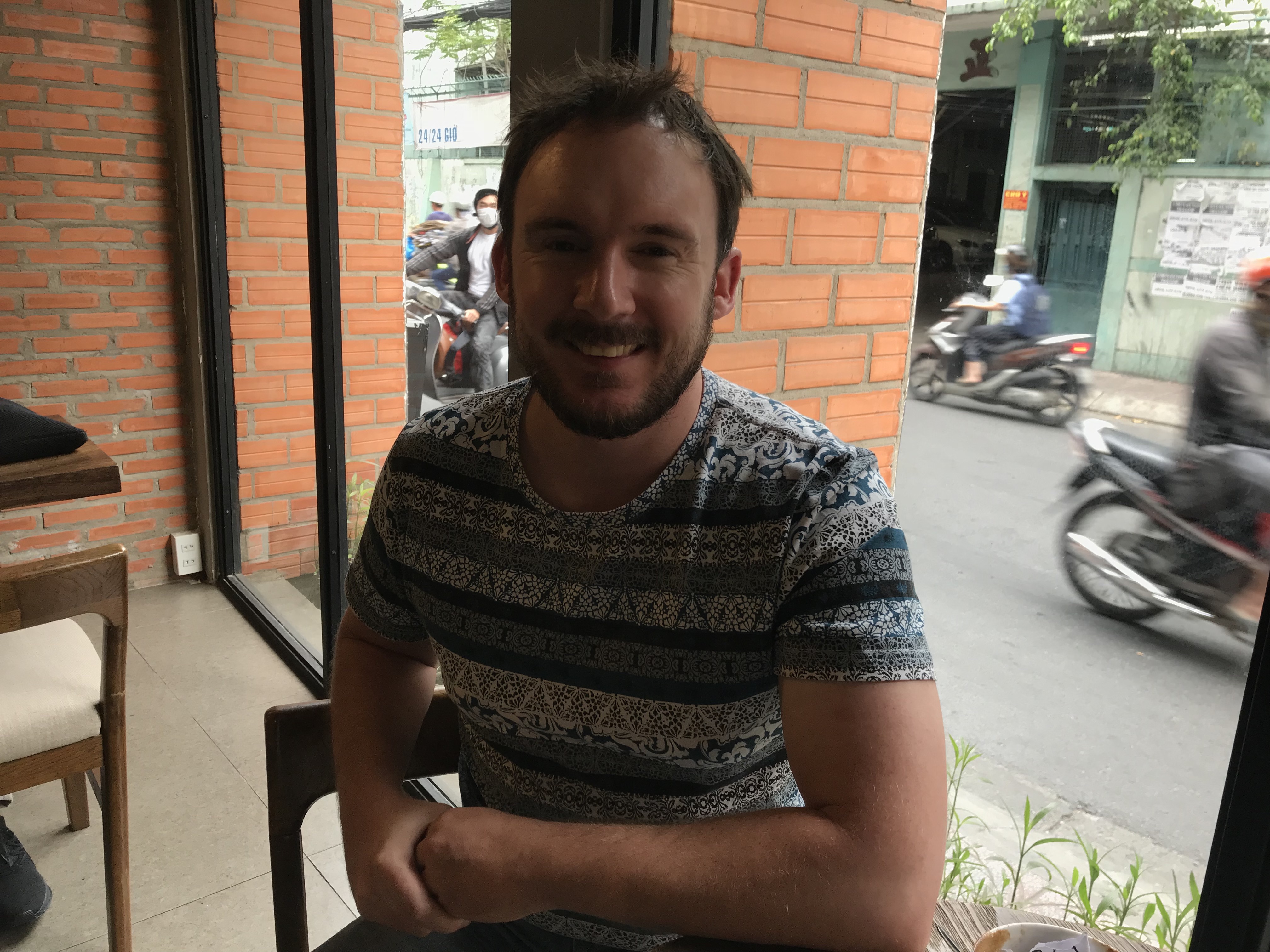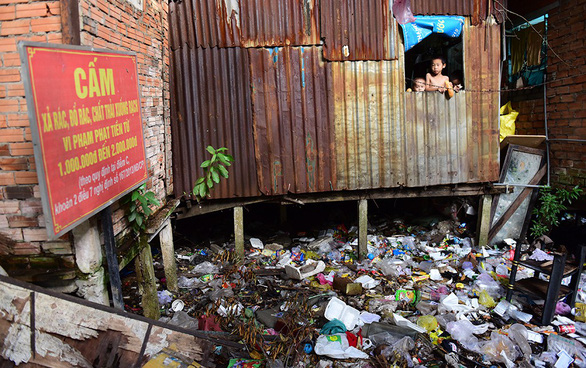Foreigners are asked about their thought on channels filled with litter and untreated domestic waste, blocking the waterflow of many Vietnamese rivers.
Urban areas being flooded with rainwater and sewage water are also a result of dysfunctional channels of the city.
Channels, which are supposed to take the water out of the city, are blocked with litter as many Vietnamese remain ignorant enough to leave trash on the streets.
Foreigners living in Vietnam voice their view of the matter as well as some of the solutions that have been implemented in their countries.
 |
| A drain on Bach Dang Street in Binh Thanh District is blocked with trash. Photo: Tuoi Tre |
Grated water drains instead of “open holes”
It is a very complicated problem, but not one that is insurmountable to deal with.
Ireland is renowned for being a country of high rainfall, but Dublin’s sewer system does not leave the city flooded after each rain. This is mainly because of population size and density and sewers free of trash.
A major factor is that in Dublin all of the water drains on the streets are grated, allowing only water or small, manageable material to seep through, while in Saigon, the holes in which water flows from the streets to the sewers are large square openings that do little to filter anything flowing down into them.
The grates prevent the pipes in Dublin and the filter system before the pumping station from being clogged with large pieces of debris.
I can see that here in Saigon, many people dump their rubbish into the large sewer openings or dispose of waste openly into the rivers, especially the households who are living by the wastewater channels.
Many of the smaller river channels are filled at floodgates with all manners of trash and it seems to be the way of things rather than something to be taken care of.
 |
| Michael Dolan in a photo he provided to Tuoi Tre News |
From my experience in Saigon, home to nine million people, there is no law against people leaving garbage bags on the streets even though there is a huge concentration of waste.
Many markets dump trash into the water channels and many households do not have sufficient bins for refuse collectors.
This is fine and good on a sunny day; however, when there is a heavy rainfall, many of those streets and market garbage are flushed into the sewers which are already ill-equipped to cope with such instances.
Many of the larger pieces of trash, tree branches, and market waste filter into Saigon’s sewers and clog them, causing high seepage into the streets as well as failing to take the water out during high rainfalls, leading to flooding in the streets.
In such cases, even though people did not do it intentionally, they still contributed to the huge amount of waste in the wastewater channels.
In Dublin, the solution to such cases would be rubbish bins and large containers.
While most of the streets of Dublin have rubbish bins available in every household, markets are equipped with large refuse containers.
It is illegal to put un-binned trash on the streets and there is a healthy flow of advanced street cleaning vehicles and garbage collectors.
All this is done so that less trash makes it to the streets and into the sewer system.
Another problem would be funding.
The Ireland Environment Protection Agency, a government body that manages the water channels and waterways in Ireland, is well funded to allow access to CCTV and other advanced technology to safeguard Irish waterways.
However, I have noticed that in Vietnam littering is not really frowned upon, especially in poorer areas where the streets and their surroundings are not very clean, failing to deter people from throwing trash on the ground, as it is pretty much the norm.
One thing that the government can do is make areas cleaner.
Michael Dolan from Ireland
Littering is harming yourself
In Australia, local councils stop or try to monitor littering and dumping rubbish by having simple reporting systems that allow the public to report dumped rubbish anywhere through a phone number or website form.
Council staff and the community can report rubbish or the dumping of large objects such as furniture in waterways. Councils use community service crews (small misdemeanor convictions) to collect/clean up such items and rubbish to keep waterways clear. Council staff and community are encouraged to report if they see someone dumping or see rubbish somewhere that could cause flooding to keep culverts clear. This will stop/reduce flooding in storms.
There are fines of $200 for littering and fines of $1 million for commercial dumping including building waste and furniture.
Councils also install grills on street drains to stop large amounts of rubbish from being washed into the drains.
 |
| Paul Hellier (right) in a photo he provided to Tuoi Tre News |
This is still a problem in Australia because landfills are expensive.
However, recycling facilities and second-hand charities have reduced the issue because people can get rid of some things for free.
Bricks, concrete, glass, steel, aluminum, plant material, electrical items and even mattresses can be recycled for a lower cost or even free and in some cases they will take the items from your home.
The company or charity taking the materials can recycle them and make money from the materials, which is a great business model that could be replicated in Vietnam.
The planet doesn’t need us, we need the planet!
You throw rubbish in the water you will be at some point eating that rubbish.
Tiny fragments of plastic are found inside fish and marine life, while microscopic fragments of plastic are now being found in human stools and in the human bloodstream.
Microscopic fragments of plastic are even being found in plants and it will not be long before food like tomatoes and spinach will be found with microscopic amounts of plastic in them.
This is not someone else’s responsibility, this is your responsibility. There is no other way.
What you throw into the river is coming back to you inside the food that you eat. If you have children you are harming their future, plastic is a hormone disrupter and potentially a carcinogen. The rubbish that you throw into the river can potentially cause a flash flood that could injure or kill your friends, family and neighbours.
The old days of throwing natural products such as food scraps and banana leaves into the environment is different, plastics are manmade from oil and are poisoning your local environment as well as the ocean.
Paul Hellier from Australia
Society’s status remains the greatest challenge
In my country, just like in Vietnam, littering and taking up channels are a considerable problem. I usually notice restaurant and diner owners have various activities that negatively affect the channel’s flow instead of protecting it.
For instance, many have a habit of pouring the dishwashing wastewater straight into the rivers, just like they throw anything they do not want to keep into the rivers.
 |
| Maytapat Pararaman in a photo he provided to Tuoi Tre News |
When I was still in high school I participated in a local campaign called “Cleaning the community” and accordingly, we went to clean areas near Chap Praya River.
Local authorities, people, children, students, and college students were all eager to clean and beautify their living area. This experience became unforgettable for me, for what I have seen shocked me deeply.
The volunteers took water from rivers to clean the floors and then poured it straight back into the rivers, while the children were playing in the chemicals that had just been taken out. Even though the campaign was held by the local authorities, even they do not acknowledge what can and cannot be poured straight into rivers before being treated.
These participants all had a good will at heart but because of their lack of understanding they can harm the waterflow and environment instead of protecting them. I think the main reason for this lack of understanding would be the lack of acknowledgment regarding the importance of these assets.
Personally I believe that society’s status is one of the greatest obstacles in improving the community’s understanding. While people are still worrying about their livelihood, it is rather difficult to raise awareness of littering, environmental pollution, or blocking channels, among others, so it is crucial to have policies improving people’s living standards.
People who have a proper understanding of the matter will voice their opinions first and take action for their community.
Maytapat Pararaman from Thailand
Like us on Facebook or follow us on Twitter to get the latest news about Vietnam!



















































